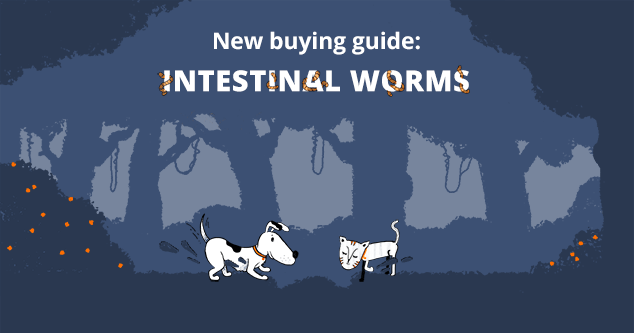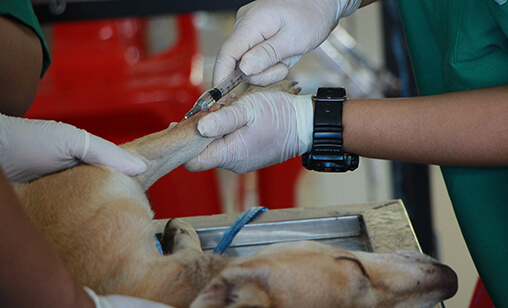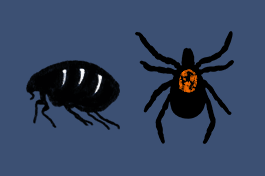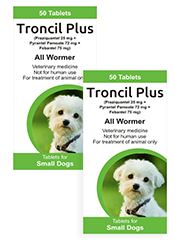Dewormer Buying Guide
Your guide to choosing the best worming treatments for pets.

- Pet Supplies
- Buyers Guide
- Dewormer Buying Guide
Why is it important to get rid of worms?
You might think that your pet might be safe from worms because they look healthy, but your cats and dogs might be victims of these intestinal parasites without you even knowing it. Intestinal parasites can inflict suffering, illness, or even death to some pets. More importantly, you should consider the safety of your household as these worms can be transmitted to humans as well. Thus, it is essential to know if your pet has worms and the proper prevention of these worms.

How it affects your pets
Worms can have harmful effects on your pet. Once these worms are in your pet's body, they will go directly to the intestines, while some might move around the body. The worms in the intestines may begin to feed in it, causing diarrhea. Others might experience vomiting or weight loss. Some parasites can cause blood loss leading to anemia, while some worms that migrate to the lungs might cause your pet to cough. Some pets, though, might not show signs of infection.
Shop for wormersCan humans get worms from pets?

Yes, and there are several ways on how humans can get parasites and worms from their pets. The most common worms that affect humans are roundworms and hookworms. Always remember to wash your hands after touching your pet. Eating after patting an infected dog or cat, without first washing your hands, can make you accidentally ingest worm eggs.

Roundworms in humans
Humans can get roundworms after ingesting egg worms. These eggs are usually found in your pet's faeces and can become infectious after 2 weeks. Unlike in cats and dogs, humans are not the hosts of these worms, so these worms will not go to our intestines. Our immune system will drive them out from our gut; thus, these worms will move to other organs like the liver, lungs, or even our brain. This disease is known as visceral larva migrans. If a parasite migrates to the lungs, asthma-like symptoms may begin. In some cases, these worms can also go in the eye, which may lead to permanent loss of vision. Worm infection in the eye is known as ocular larva migrans.

Hookworms in humans
Hookworms, on the other hand, can enter our bodies by eating their way into our skin. Just like in roundworms, hookworm eggs are also found in your pet's faeces. Once under the skin, they will leave red, itchy, and swollen winding tracts known as cutaneous larva migrans.
Get to know how humans can get worms from cats or dogs and how to prevent them by reading our article.
Learn more about preventing wormsWhat are the types of worms in pets?
Roundworms, hookworms, whipworms, and tapeworms are the common types of worms found in pets. Only the roundworms and tapeworms though, can be seen by our naked eye in the stool.

Common worms in cats
Most common intestinal worms in cats in the US are:
- roundworms (Toxocara cati and Toxascaris leonina)
- hookworms (Ancylostoma tubaeforme, Ancylostoma brazilense and Uncinaria stenocephala)
- tapeworms (Dipylidium caninum, Taenia taeniaeformis and very occasionally Echinococcus spp)

Common worms in dogs
Most common intestinal worms in dogs in the US are:
- roundworms (Toxocara canis and Toxascaris leonina)
- hookworms (Ancylostoma caninum, Ancylostoma brazilense and Uncinaria stenocephala)
- whipworms (Trichuris vulpis)
- tapeworms (Dipylidium caninum, Taenia spp and very occasionally Echinococcus spp)
How do pets get worms?

Cats and Dogs
Once your pet gets their nose on soil or water contaminated by an infected animal's faeces, and ingest the egg worms, then your pets are infected. Common ways pets can get worms are by:
- Getting in contact with infected animals
- Ingesting worm larvae or eggs (infected faeces or in the grass)
- Ingesting raw meat (infected prey animals or infected parasites)
However, some worms have other means to get to your pet. Tapeworms don't immediately go to your pet. These parasites live inside immediate hosts like fleas, lice, and small rodents. If these parasites are not controlled, these parasites can infect your pet with worms. Hookworms, on the other hand, can get to your pet either by ingesting them or by eating through your pet's skin, usually on their feet.

Puppies and kittens
Puppies and kittens are the most vulnerable as they can get it while feeding from their infected mother. Unborn pups can get worms whilst still inside their infected mother's womb.
Prevention
Here are some ways to keep your pets off from worms:
- Remove stools after your pet in the yard and their litter boxes. By cleaning up after your surroundings, you are keeping your pet away from reinfestation.
- Bring them to the vet for a checkup to know if any parasites are in your pet and what type of wormer you should use. Having your pet on an annual checkup is good to know your pet's overall health.
- Bath your pet regularly. Since your pets love to lick, it's better to give them frequent showers to rid your pets of any stool stuck on them. It's also an effective practice to wipe your pet's paws after spending time outdoors.
- Use worm preventive treatment for your pets. Monthly preventives of heartworm control kill other types of worms as well.
- Always keep an eye on where your dog goes. Places like the (dog) parks are usually infected with intestinal worm larvae.
- When your pet is prone to reinfestation, your vet might recommend using wormers around the year.
- Dogs love investigating things, but they usually end up getting worms through their nose. To avoid reinfestation, Practice Leave It.
How to tell if your pet has worms?

Pets need regular checkups with a vet, where a stool sample will be tested for any presence of worms. In case you do see worms in your pet's stool, vomit or around their bottom, wrap them up in a damp cotton towel, and show it to your vet.
As symptoms do not always show, your vet may recommend a regular worm treatment for your pet. For pets who don't manifest any symptoms, some worm eggs or larvae can be dormant in your pet. They can be activated when your pet is stressed. For roundworms and hookworms, they may wait until the later stages of pregnancy, ready to infest soon to be born pups and kittens. These parasites need your pets to stay alive, this is why they don't want to be detected for them to remain inside your pet.
Common signs of worms in pets are as follows:
- Weight loss
- Dry and coarse hair
- Vomiting (sometimes with worms)
- Their fur is becoming dull and coarse
- Increased appetite, diarrhea (probably with blood), and weakness
- Puppies and kittens may have "pot belly" for severe cases
- General poor appearance.
What to do if your pet has worms?

Deworm your cats and dogs
Intestinal parasites don't usually cause diseases but rather steal nutrients from your pet. This makes them less healthy and, therefore, more vulnerable to skin issues and bacterial infections. Avoid this by using deworming medications on your pet. These medications are usually safe, but for infected pets, they may experience lethargy or loss of appetite as a result of worms being removed from their body. It may still be reasonable to see worms in your pet's stool a few days after your pet has taken these medications.
These medications can have several forms:

How do they work?
Most medications can kill several kinds of worms. Make sure that when you select a product, it can ensure that your pet is wormed completely. There are several medications with ingredients that can kill various worms effectively.
How long before it works?
Most wormers will kill adult intestinal worms during treatment, but only a few will be able to target migrating parasites. The frequency of giving treatment depends entirely on the type of worms, and the time it takes these worms to produce eggs.

How often should you deworm your pet?
- Kittens should start treatments for intestinal worms at six, eight, ten, and 12 weeks old, then once a month until they are three months old. Later every three months throughout their life.
- Puppies should start intestinal worm treatments at two, four, six, eight, ten and 12 weeks old, then once a month until they are three months old, then every three months onwards.
- Cats should be treated at least every three months throughout life. For breeding cats, they should be wormed before mating, and once pregnant, they should be treated ten days before kittening and fortnightly while the kittens are suckling. Read more about worming your cats.
- Dogs should have treatment at least every three months during their lifetime. In some areas where tapeworms are a problem, it is recommended to have three to six-weekly medications instead. Before mating, female dogs should be wormed and then from at least day 42 of pregnancy. When pups are suckling. They should be wormed fortnightly. Read more about worming your dogs.
Best dewormers for pets
Best dog dewormers
Best cat dewormers
Worm Control Chart
Check out this chart to see which pets meds are suitable for your pet:
| Fleas |
Ticks |
Heartworm |
Intestinal Worms |
||||||||||
| Product |
Usage | Adult Fleas |
Flea Eggs |
Flea Larvae |
Deer Tick |
American Tick |
Lone Star Tick |
Brown Tick |
Heartworm |
Round-worms |
Hook-worms |
Whip-worms |
Tape-worms |
| Revolution | Spot On | Cats |
Cats |
||||||||||
| Revolution + Canex | Spot On | Dogs |
Dogs |
||||||||||
| Stronghold | Spot On | Cats |
Cats |
||||||||||
| Advantage Multi | Spot On | ||||||||||||
| Profender | Spot On | ||||||||||||
| NexGard Spectra | Chew | ||||||||||||
| Heartgard Plus | Spot On | ||||||||||||
| Drontal | Spot On | ||||||||||||
| Generic Heartgard Plus | Tablet | ||||||||||||
| Generic Sentinel | Tablet | ||||||||||||
| Generic Drontal | Tablet | ||||||||||||
| Generic Revolution for Cats | Spot On | ||||||||||||
Check out our ultimate comparison chart for all your pet's parasite control (flea, tick, worm, and heartworm).
Check comparison chartWormers Testimonials at Pet Shed
Advantage Multi (Advocate)
Great for a lot of things but not ticks
Jul 01, 2020
Keeps the dog flea, worm and heartworm free. Great product. I wish it worked on ticks - doesn't. I live in a high-tick area, so I wind up having to use two products. It works out though because I don't need anything for worms or heartworm. Just keep in mind you will something for ticks if you live someplace with a lot of ticks.
NexGard Spectra
Very Pleased
Jun 27, 2020
Have been using NexGard Spectra now for 2 years on both CBRs in south central WI. Although we live in the country, haven't yet found an attached tick on either of them.
Stronghold for Cats & Dogs
Great Product
Mar 05, 2019
I've been using this product for years on both my dog and cat (he's indoor/outdoor) with no side effects. Very good at flea control. Decent with the ticks too, although the pets can still carry them in the house and I'll find ticks (3 or 4 per year) crawling up the curtains and walls in late July and August. I think that is just because we haven't had severe winters the last 3 years and the insects survive better. I like that it covers worms and lice too. I am so thankful that I can buy it here at Pet Shed for the best price available! Highly recommended!
Generic Drontal for Cats (Pyrantel Pamoate & Praziquantel)
Amazing product
Dec 07, 2018
Running an all volunteer, non-profit cat rescue org. is difficult due to the high cost of Veterinary care. When we find a product to treat the stray cats/kittens that come to us that actually works it's a real morale booster. Knowing these animals will soon feel better gives us all comfort. This product has proven to be the best one to use plus it is very inexpensive. The cats feel much better within 24 hours! Great product all the way around!
Advantage Multi (Advocate)
fantastic
Mar 13, 2018
i use stronghold, revolution or advocate depending on which i can get the best deal on. I have 4 cats and 4 dogs...these are the best products i have ever used... no issues for the animals and oh so easy to administer!
NexGard Spectra
bug treat
Jun 23, 2018
I have been using this on my dogs for awhile now an I really like the results ,some things make dogs kind of sick an so far I haven't seen this ,also they don't always eat what I give them but this they chew it up I don't have to make them swallow it!
Revolution for Cats & Dogs
My Vet Recommended Revolution
Jan 22, 2018
A few years back our cat started acted strangely. She didn't seem steady on her feet and was sluggish. When we took her to the vet he told us she was having an allergic reaction to FLEAS! I had been using Frontline for some time (can't remember for sure but think it had been several years). He said he had switched to selling Revolution in his office and went on to explain why. Pretty much repeated whats written here in the description. I purchased only one application because it was VERY, VERY expensive in his office. As soon as I came home I placed an order here which always saves us quite a bit of money. Our cat has been fine ever since.
Preventer Plus (Milbemycin oxime & Lufenuron)
It works!
Nov 13, 2017
This product works! ya'll must give it a try, you'll save a lot and you'll definitely get your babies protected from harm. You're like hitting two birds in one stone! Perfect!
Generic Drontal for Dogs (Praziquantel, Pyrantel Pamoate & Febantel)
Fantastic meds!
Aug 08, 2017
I was always worried about my dogs and this medication right here gives me peace of mind. Thank you so much!!!!!!!!!!!!!
Preventer Plus (Milbemycin oxime & Lufenuron)
Never seen a flea on my outside dogs!
Aug 17, 2017
I have two labs that stay outside. With this pill I have had only 1 tick in 6 months and have never seen a flea on my girls! Very much worth it!
FAQs
-
How long does it take for worms to leave a dog?
Most medicines will act upon parasites as quickly. It can take as early as two hours to kill the worms, but it usually takes 12 hours for the process to start. Worms may still be seen in a week after administration, but for severe cases, it can take up to two weeks. You will know if the medication is successful if the worms become transparent or almost impossible to see. This means they should be dead. If not, then it means that medication hasn't worked, and you should try using another product with different active ingredients.
-
What to do if my dog has worms?
Intestinal worms are dangerous to pets as they steal the nutrients your pets have in their bodies. This is why you should give proper medication for your pet. If you found some worms in your pet's stool, vomit or bottom, have it wrapped on damp wool fabric and show it to your vet. Your vet may recommend a regular worm treatment for your pet.
-
How often should I deworm my cat or dog?
Deworming your pets should be done every 3 months, depending on the type of medicine your pet is taking. For meds with heartworm control, it should be taken monthly. For puppies, they should start deworming every other week at 2 weeks to 12 weeks old then every three months after. For kittens, they should begin to take medications every other week at 6 weeks old to 12 weeks. For breeding pets, they should be dewormed before mating and fortnightly while their babies are suckling. For pregnant dogs should also be dewormed from at least 42 days of pregnancy.
Pet Care Essentials

Flea and Tick Control
Fleas and ticks are common pet parasites known to be disease carriers. They are not just irritating but also harmful to your pets. Keep your pets safe and comfortable with flea and tick medications.
Shop for Flea and Tick Control
Heartworm Control
Heartworms are dangerous roundworms transmitted by mosquitoes as a larva that matures into your pet's major organs, posing a significant threat to their health. Prevent your pet from the dangers of heartworms with heartworm control.
Shop for Heartworm Control
Wormers
Worms are parasites that commonly affect cats and dogs. There are lots of ways your pets can get infected if untreated. Regular dosing of worm control can help prevent the spread of parasites for your pets, family, or environment.
Shop for Wormers






